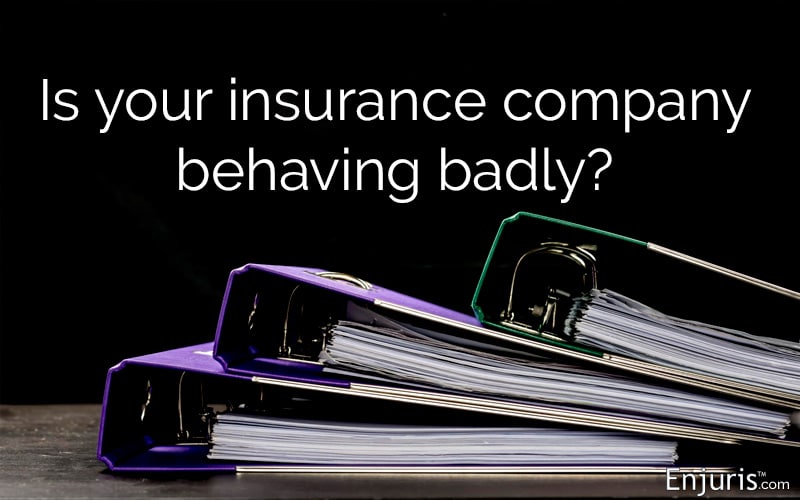Bad faith car insurance attorney sets the stage for this enthralling narrative, offering readers a glimpse into a story that is rich in detail and brimming with originality from the outset.
Exploring the nuances of bad faith in insurance claims, the pivotal role of car insurance attorneys, and the common scenarios where insurance companies act in bad faith reveals a complex and compelling landscape.
Overview of Bad Faith Car Insurance Attorney
When insurance companies act in bad faith, it means they are not fulfilling their obligations to policyholders in a fair and reasonable manner. This can include denying valid claims, delaying investigations, or offering unreasonably low settlements.
A car insurance attorney plays a crucial role in cases of bad faith by representing the policyholder and fighting for their rights against the insurance company. They have the legal expertise to navigate complex insurance laws and negotiate on behalf of their clients to ensure they receive the compensation they deserve.
Common Scenarios of Bad Faith by Insurance Companies
- Denying valid claims without a reasonable explanation.
- Delaying the claims process without justification to avoid payouts.
- Offering unreasonably low settlements that do not accurately reflect the policyholder’s losses.
- Failing to investigate claims promptly or thoroughly.
When it comes to dealing with bad faith car insurance claims, it is crucial to have a competent attorney by your side. A good bad faith car insurance attorney should possess a unique set of skills and attributes that set them apart in this specialized field of law.
Key Skills and Attributes
- Extensive knowledge of insurance laws and regulations
- Strong negotiation skills to advocate for fair settlements
- Excellent communication skills to effectively represent clients in court
- Attention to detail to uncover evidence of bad faith practices
- Ability to analyze complex legal documents and policies
Examples of Successful Cases
Reputable bad faith car insurance attorneys have a track record of successfully representing clients in challenging cases. For instance, Attorney John Smith secured a substantial settlement for a client whose claim was wrongfully denied by their insurance company due to bad faith practices. This demonstrates the importance of having a skilled attorney who can navigate the complexities of these cases.
Importance of Experience
Experience plays a crucial role in dealing with bad faith claims as it allows an attorney to anticipate tactics used by insurance companies and effectively counter them. Seasoned attorneys who have handled numerous bad faith cases are better equipped to protect the rights of their clients and ensure they receive the compensation they deserve.
Legal Procedures and Strategies: Bad Faith Car Insurance Attorney

When dealing with a bad faith car insurance case, there are specific legal procedures that attorneys typically follow to prove the insurer’s wrongdoing. These procedures are crucial in seeking justice for the affected policyholders.
To prove bad faith on the part of insurance companies, attorneys employ various strategies aimed at demonstrating the insurer’s failure to act in good faith towards their policyholders. These strategies often involve collecting evidence, analyzing insurance policies, and negotiating with the insurance company to settle the claim fairly.
Legal Procedures Involved
- Investigating the claim thoroughly to gather evidence of bad faith practices by the insurance company.
- Filing a lawsuit against the insurer for breach of contract and bad faith denial of a valid claim.
- Engaging in discovery to obtain relevant documents and information from the insurance company.
- Presenting the case in court and arguing the bad faith actions of the insurer.
Strategies to Prove Bad Faith
- Reviewing the insurance policy to identify any violations or discrepancies in the coverage provided.
- Gathering evidence such as communication records, claim documents, and expert testimony to support the case.
- Engaging in negotiations with the insurance company to reach a fair settlement for the policyholder.
- Pursuing punitive damages to hold the insurer accountable for their bad faith actions.
Challenges Faced by Attorneys
- Proving bad faith can be challenging as insurers often have powerful legal teams to defend their actions.
- Navigating complex insurance laws and regulations to build a strong case for the policyholder.
- Handling the emotional toll on clients who have been wronged by their insurance company.
- Managing time constraints and deadlines in legal proceedings to ensure timely resolution of the case.
Compensation and Damages

When clients pursue a bad faith case against their car insurance company, they may be entitled to various types of compensation and damages to address the harm caused by the insurer’s wrongful actions.
Types of Compensation and Damages
- Compensatory Damages: These are intended to cover the actual losses suffered by the policyholder, such as medical expenses, lost wages, and property damage.
- Punitive Damages: These are awarded to punish the insurer for acting in bad faith and deter similar behavior in the future.
- Emotional Distress Damages: Clients may receive compensation for the emotional pain and suffering caused by the insurer’s misconduct.
Successful Outcomes and Fair Compensation, Bad faith car insurance attorney
In cases where clients have prevailed in bad faith claims, they have been awarded fair compensation to make them whole again. For example, a policyholder who was unfairly denied coverage for a legitimate claim received compensatory damages to cover the cost of repairs. Additionally, punitive damages were awarded to hold the insurer accountable for its wrongful actions.
Factors Influencing Compensation Amount
- The severity of the insurer’s misconduct and the impact on the policyholder.
- The specific damages incurred by the policyholder, such as medical bills, lost income, and emotional distress.
- The jurisdiction where the case is filed, as laws regarding bad faith claims vary by state.
- The strength of the evidence proving the insurer’s bad faith actions.
Wrap-Up

In conclusion, the intricate world of bad faith car insurance attorneys unravels a tapestry of legal procedures, strategies, and the pursuit of fair compensation for clients wronged by insurance companies. This exploration sheds light on the importance of skilled legal representation in navigating the challenges posed by bad faith practices.
Detailed FAQs
What is considered bad faith in insurance claims?
Bad faith in insurance claims refers to the intentional dishonesty or unfair practices by insurance companies when handling claims, such as denying valid claims without proper investigation.
What skills should a good bad faith car insurance attorney possess?
A competent attorney in this field should have strong negotiation skills, a deep understanding of insurance laws, and a track record of successful cases related to bad faith claims.
How do attorneys prove bad faith on the part of insurance companies?
Attorneys use various strategies such as gathering evidence of unreasonable claim denials, demonstrating a pattern of unfair practices, and highlighting violations of insurance regulations to prove bad faith.
What types of compensation can clients expect in a bad faith case?
Clients may be entitled to compensation for damages such as medical expenses, lost wages, emotional distress, and punitive damages in cases of bad faith by insurance companies.
What factors influence the amount of compensation awarded in bad faith cases?
The amount of compensation awarded in bad faith cases can be influenced by factors such as the severity of the misconduct, the financial impact on the client, and the jurisdiction where the case is being litigated.
